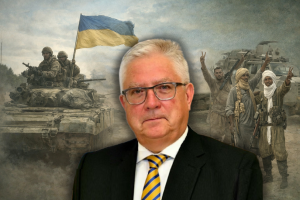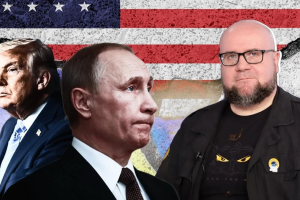This policy brief was prepared exclusively for "Rubryka"
International Developments
- US President Biden's visit to Poland conveys a strong message to all European allies that America is determined in its support to Ukraine and NATO. It will further boost NATO's defense capabilities allowing the Alliance to reach practical decisions in its further military support of Ukraine. This is especially important due to the position of key members of the international "fighter jet coalition" (Poland in particular) that any decision on sending Western fighter jets to Ukraine is to be based on the NATO collective agreement.
- The trilateral high-rank meeting between Ukraine, NATO and EU representatives was held in Brussels on Tuesday, February 21. It was the first high-level meeting of its kind to directly address the problem of coordination of Western European military industries' priorities with Ukraine's strategic military needs. It resulted in closer cooperation in ammo/weapon systems manufacturing.
- The People's Republic of China presented its "peace plan" to end russia's war in Ukraine, dedicated to its anniversary. However, the "plan" appeared more of a political statement by Beijing rather than a working mechanism initiative. Its main goal is to allow China to have a seat at the negotiations table as one of the peace brokers and ensure Beijing's active role in the future security arrangements in Europe. It also could be a way to disguise intentions to supply arms to russia via third countries (Iran, Tajikistan, Belarus, DPRK).
- putin made two major public appearances last week in an attempt to reinvigorate russian public support of its year-long lame war efforts. However, the lack of significant military results and failure to gather the resources needed to start major offensive operations left him with nothing substantial worth mentioning.
putin's address to the russian Parliament didn't mention the war developments, results or even military/political objectives. Its main goal seemed to prepare russian population for the long strategic confrontation with the "collective West" and the United States – particularly his announcement of "suspending" russian participation in the new START treaty. This shift in priorities seems to indicate that russian political and military leadership realizes the strategic failure of its military campaign in Ukraine. putin starts looking for options for preserving his regime and the personal loyalty of his elites under these circumstances.
putin's later appearance in the official concert dedicated to russia's "Defender of the Fatherland Day" seemed more like a routine propaganda show rather than an attempt to systematically address serious problems kremlin aggression against Ukraine had created.
War/Security Situation
- At the kremlin aggression anniversary, russian forces seemed to suffer more setbacks in preparations for the major offensive. They proved unable to demonstrate any significant battlefield results or even to produce the necessary political and psychological pressure on Ukraine with the cruise missile attack, which was highly anticipated but never came.
It forced kremlin to launch "plan B" – a propaganda campaign aimed at threatening with military tensions in the Transnistria region of Moldova. The lame effort's objectives were twofold.
- First, it was obviously aimed at the russian domestic audience in an attempt to covertly hint at the reasons for the absence of any military successes in Ukraine.
- Second, it was designed to threaten NATO South-Eatsern members with another potential conflict and escalation risk.
Conclusions and Recommendations
- US President Biden's visit to Kyiv and Warsaw in the wake of the anniversary of russian full-scale invasion of Ukraine sent a major geopolitical message to Western allies and russian leadership. Ukraine and its Western allies will remain at the core of regional and global security and geopolitical transformations, whereas russian regional and international influence will deteriorate. Kyiv should exploit this momentum to intensify political, military and economic dialogue with key Western allies to get maximum aid in the shortest possible time. It would also be helpful if this trend could be further exploited at the next NATO summit in Vilnius to (1) get political unity of the Allies on military aid issues (especially long-range artillery and fighter jets) and (2) to start accumulating political support for Ukraine's future membership.
- Two putin's major public appearances last week seemed like a weak attempt to (1) prepare russian population for a long strategic confrontation with the "collective West" and the United States and (2) support the current failed political course with more propaganda efforts. It indicated putin's regime is facing growing inner tensions and a potential domestic crisis unless russian leadership proves capable of rebooting its aggressive foreign policy course by shifting the domestic agenda from being Ukraine-centered to a broader geopolitical confrontation with the West.
- Trilateral high-rank meeting between Ukraine, NATO and EU representatives was another significant step in addressing Ukraine's strategic military needs after US President Biden visited Ukraine and Poland. The meeting resulted in a closer cooperation agreement in ammo/weapon systems manufacturing between Ukraine and its Western European allies. Its results lay the foundation for future practical cooperation mechanisms and systematic addresses of Ukraine's defense and military needs.
- russian propaganda campaign of threatening with military tensions in the Transnistria region of Moldova was meant to cover russian forces' inability to demonstrate any significant battlefield results on the war's anniversary. It eventually failed, however, allowing kremlin to at least temporarily draw public attention from its battlefield and domestic problems.
______________________________________
This policy brief was prepared exclusively for "Rubryka" as part of a project "russia-Ukraine Conflict: from Full-Scale War to Conflict Resolution and Post-War Reconstruction" implemented in cooperation with the Razumkov Centre with the support of the MATRA program of the Embassy of the Netherlands. The opinions expressed are those of the author(s) only and should not be considered as representative of the Embassy's official position.








